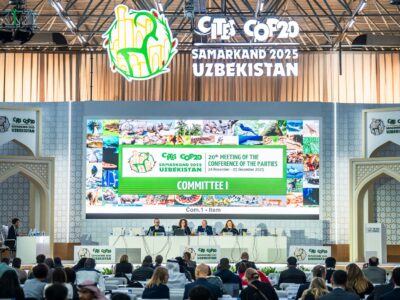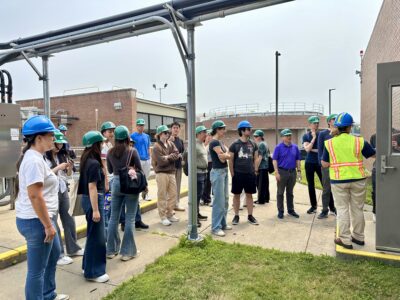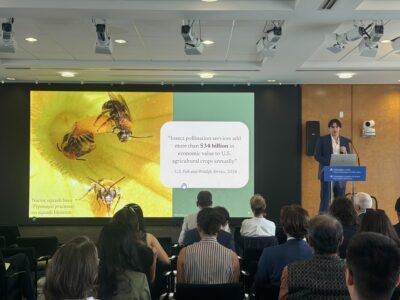
Prior to joining the MPA in Environmental Science and Policy (MPA-ESP) program, current student Jessica Bensley was the owner and Chief Operating Officer of her own Barbados-based map publishing company, Skyviews Inc. While working at Skyviews Inc., Jessica saw firsthand how the environmental issues, namely topographical pressures, faced by the small island Caribbean states that she was promoting were only microcosms of today’s larger global environmental problems. As a career-changer, Jessica hopes that her education in the MPA-ESP program will allow her to contribute meaningfully to solving global economic resource crises by developing her knowledge of the science, policy, and economics.
1. What were you doing before you started the MPA-ESP program?
I am the owner of Skyviews Inc., a Barbados-based publishing company that produces road maps and marketing support material to the private and government agencies involved in tourism in the Leeward and Windward Caribbean islands. I was also an active volunteer in Barbados for the Youth Business Trust, an agency which aims to promote self-employment and entrepreneurship for Barbadian youth.
2. What drew you to the Master of Public Administration in Environmental Science and Policy program (MPA-ESP)?
Over the course of the last five years, I became more sensitive to the topographical changes and shifting cultural identities of the Caribbean countries that I was promoting. I sensed a deepening crisis regarding our natural resources and the use of them in the pursuit of development. I noted that the issues faced by small island Caribbean states are merely magnified views of the global issues at hand. I recognized that I needed to develop my knowledge of the environment, policy, and economics to the issues affecting the world in order to contribute meaningfully to the solution. I was drawn to the MPA-ESP program because of Columbia’s international reputation as a top-tier educational institution as well as the fact that the program combines training in both the sciences as well as policymaking. I was also impressed with the number of international students in the program and the global approach that the program takes towards environmental issues.
3. What area of environmental policy and management are you most interested in?
My primary interest in the area of environmental policy and management is to understand the nuances and challenges of how we manage the global resources of the earth as individual nations. More specifically, I am interested in water, food, and waste. I am currently exploring the external virtual water footprint of countries as they relate to global food security and the policy drivers that will need to be managed as a result of environmental depletion and climatic change.
4. What skills and tools do you hope to acquire through the program?
I have acquired skills about the environmental aspects through the chemistry, hydrology and climatology courses. I have also refined my understanding on the economic drivers for corporations, and the interplay on policy and the environment. By the end of the program, I expect to understand how national issues affect global situations.
5. What is your favorite class in the MPA-ESP program so far, and why?
I was nervous about embarking on the environmental chemistry and climatology courses with Professors Juerg Matter and Jason Smerdon respectively, as I had a very limited background in science. However the quality of tutoring in both subjects made the classes thoroughly enjoyable. I now have a solid understanding of the environmental issues at hand substantiated with effective scientific knowledge.
6. How has collaborating with your fellow students in class projects benefitted you professionally and personally?
A substantial amount of the course requires group collaborations. The caliber of students is exceptional and diverse – two qualities that lead to animated exchanges and quick learning. Group work has developed my skills in collaborative techniques, human dynamics and varied industry knowledge. In our Workshop output I am a manger leading the team in the Water Resiliency and Sustainability Act, I am continually amazed by the diversity of skills that each member brings to the outputs.
7. Beyond the classroom, what, if any, extracurricular sustainability-related activities have you engaged in with your fellow Environmental Science and Policy students?
Over the summer, the class traveled to the Lamont-Doherty Earth Observatory where we were honored to meet with scientists working with ocean core samples, ocean acidification, climate sensitivity and carbon sequestration. On another outing we visited the Gowanus Canal, a United States Government superfund site, where we had the opportunity to engage with stakeholder groups, like our tour guides from the Friends and Residents of Greater Gowanus (FROGG), as well as the workers at the site. We also have visited urban regeneration projects in the Bronx together; the projects involved restoring wetlands, green corridors and creating community activities for the public including youth projects.
8. How do you intend to utilize your degree from the MPA-ESP program to further your career?
My intention is to work globally and bring about change in ethical environmental business practices. There is a strong support system in effect for career development through SIPA’s Office of the Career Services and our faculty advisors. With the help of these resources, I am researching corporations and conducting informational interviews – activities which are helping me to fine tune the opportunities best suited for my personality and interests.
Students in the MPA in Environmental Science and Policy (MPA-ESP) program enroll in a year-long, 54-credit program offered at Columbia University’s School of International and Public Affairs (SIPA), in partnership with the Earth Institute. Throughout this one year program, students are immersed in courses that combine Columbia University’s hands-on approach to teaching public policy and administration with pioneering thinking about the environment. During the summer semester, students learn the fundamentals of environmental science, while the fall and spring semesters focus on teaching the policy and economics necessary to becoming successful environmental analysts and managers. Please visit our website to learn more about the program.



